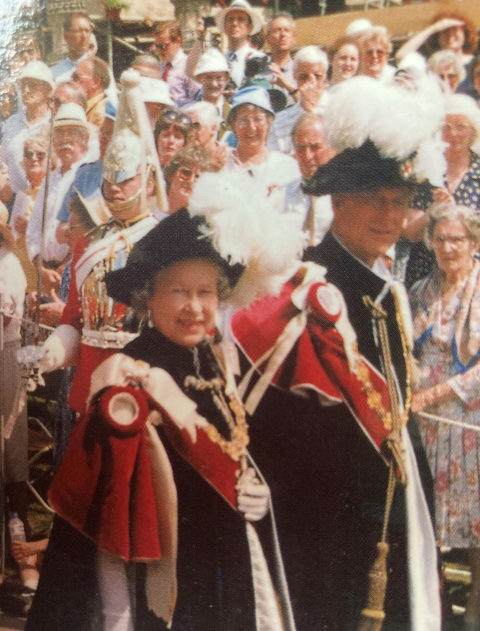 Garter Day, Windsor, 1996. [photo by Victoria Schofield]
Garter Day, Windsor, 1996. [photo by Victoria Schofield]
Victoria Schofield is the Chair of the editorial board of the Round Table. She shares this tribute to Queen Elizabeth II.
As with other significant events in our lives, across the world we are all likely to remember where we were on 8 September 2022 when the announcement came that Her Majesty The Queen had died in Balmoral that afternoon aged 96. I was at home listening anxiously to the news since we’d heard earlier in the day that she was under medical supervision. Even so I was shocked at the speed with which The Queen departed, when, only two days previously, she had been photographed shaking hands with the new Prime Minister, Liz Truss. Albeit frail, she was emitting that familiar radiant smile and, assisted by a stick, was on her feet, her hand outstretched in welcome.
Round Table statement
Tribute by Sir Peter Marshall
Tribute by Sir Shridath Ramphal
For most of us in the United Kingdom of Great Britain and Northern Ireland and in the 56 members of the Commonwealth (fourteen of which still retained The Queen as Head of State) Queen Elizabeth II was the only monarch we had known, her face on our postage stamps and on our currency, ‘EIIR’ emblazoned on our red letter boxes. I still have the silver ‘crown’ coin which my parents gave me in commemoration of her Coronation in June 1953. That my crown coin (five shillings – or ¼ of a £) is now described as having a value of £0.25, is a powerful reminder of how much changed during her seventy-year reign, economically, politically and socially. Not only has our currency been decimalised, but there has been devolution, granting a greater level of self-government to Scotland, Wales and Northern Ireland; as we keep being reminded, The Queen appointed fifteen Prime Ministers from Churchill to Truss; during her reign, the United Kingdom joined the European Union, and then left it. Men walked on the Moon; the first test-tube baby was born; we developed computers, ‘smart’ phones and electric cars. ‘9/11′ took place in the United States and the ‘7/7’ bombing in London.
In the post-World War II environment, on The Queen’s behalf, as head of the British Armed Forces British and Commonwealth, sailors, soldiers and airmen fought and died in numerous conflict zones throughout the world, culminating in Iraq and Afghanistan, where her grandson, Prince Harry, briefly served. Also during her reign, The Queen witnessed sporting triumphs, especially for British and Commonwealth athletes in the Olympic and Commonwealth Games, as well as poignant disasters, of which, as we know, the tragic mudslide at Aberfan in 1966, in which 116 school children and 28 adults were killed, remained in her memory.
And despite such momentous change, the Queen’s presence in our lives was always reassuring: the protective mother or grandmother some of us may never have had. Although she met thousands of people, there were millions she did not meet and yet she was constantly in our drawing rooms, appearing annually on our television screens in her Christmas Day broadcast and at times of crisis, such as most recently during the Covid-19 pandemic.
From the archives:
“Devoted to your service” – 70 years of the Queen as Head of the Commonwealth (2022)
The British Monarchy and the Modern Commonwealth (2022)
Long-lived Queen (2015)
In person she went ‘walkabout’ throughout the world, uppermost on her itinerary the countries of the Commonwealth, which gave her a stature and presence far beyond the British Isles – in Canada, the Caribbean, the Mediterranean, Africa, and the islands of the Pacific including Australia and New Zealand. Throughout her tenure as Head of the Commonwealth, The Queen remained true to the conviction expressed in her Christmas Day broadcast in 1953 in which – in a post-colonial world – she imagined the Commonwealth as ‘an entirely new conception – built on the highest qualities of the spirit of man: friendship, loyalty and the desire for freedom and peace.’ As so many commentators have emphasised, she maintained that belief throughout and beyond the period of decolonisation, as the United Kingdom transformed itself from an imperial power, the characteristics of multiculturalism, diversity and tolerance becoming paramount.
Her presence at the bi-annual Commonwealth Heads of Government Meeting (CHOGM) reinforced the importance she attached to the association. On behalf of The Round Table, I was privileged to witness how, even at the age of 85, she travelled halfway across the world to attend CHOGM 2011 in Perth, Western Australia. Only as old age finally took its toll did she stop visiting the Commonwealth’s more far-flung members. And perhaps it was fitting that CHOGM 2018, which was held in London – in Buckingham Palace – became her swansong, HRH Prince Charles (now King Charles III) representing her at CHOGM 2022 in Kigali, Rwanda earlier this year.
Of all the epitaphs I have heard spoken in tribute to The Queen’s service, extolling her sense of duty and devotion, combined with dignity and grace, the words of Mr Valiant-for-truth in The Pilgrim’s Progress seem the most apt:
My sword, I give to him that shall succeed me in my pilgrimage, and my courage and skill to him that can get it. My marks and scars I carry with me, to be a witness for me, that I have fought his battles, who will now be my rewarder.



